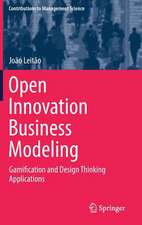Entrepreneurship, Human Capital, and Regional Development: Labor Networks, Knowledge Flows, and Industry Growth: International Studies in Entrepreneurship, cartea 31
Editat de Rui Baptista, João Leitãoen Limba Engleză Hardback – 26 ian 2015
Although there has been significant research so far into the success and failure of clusters, the implications of these multiple research efforts fail to provide political decision-makers and company managers with critical information about which mechanisms lie behind cluster success and also about how clusters survive and prosper. The innovative approaches presented in this book on entrepreneurship, human capital mobility and regional development have considerable potential to create new and original implications for decision-makers and managers.
In terms of value added, this book contributes to the literature by seeking answers to the following questions:
(i) Is the growth and success of clusters over time due to concentration and transmission of business competences through spin-offs located in a given regional space?
(ii) Does increased density of job options outside the workplace contribute to increased mobility of human capital between firms located within clusters, and soimprove coordination in the local labor market?
(iii) Do spin-offs benefit from hiring workers from successful incumbents, inasmuch as those workers are expected to perform better than other workers from different origins?
Integrating theoretical frameworks, empirical research, and regional case studies (from Portugal, Spain, Norway and Turkey), the editors and contributors demonstrate that the regional dynamics of industry growth are strongly influenced by the mobility of employees towards new firms.
Din seria International Studies in Entrepreneurship
-
 Preț: 362.53 lei
Preț: 362.53 lei - 17%
 Preț: 428.32 lei
Preț: 428.32 lei - 15%
 Preț: 642.68 lei
Preț: 642.68 lei - 15%
 Preț: 640.55 lei
Preț: 640.55 lei - 15%
 Preț: 637.78 lei
Preț: 637.78 lei - 18%
 Preț: 951.29 lei
Preț: 951.29 lei - 15%
 Preț: 644.30 lei
Preț: 644.30 lei - 18%
 Preț: 947.85 lei
Preț: 947.85 lei - 15%
 Preț: 643.99 lei
Preț: 643.99 lei - 15%
 Preț: 642.51 lei
Preț: 642.51 lei - 18%
 Preț: 953.65 lei
Preț: 953.65 lei - 18%
 Preț: 949.73 lei
Preț: 949.73 lei - 15%
 Preț: 637.59 lei
Preț: 637.59 lei - 15%
 Preț: 642.51 lei
Preț: 642.51 lei - 15%
 Preț: 642.68 lei
Preț: 642.68 lei - 18%
 Preț: 952.72 lei
Preț: 952.72 lei - 18%
 Preț: 951.47 lei
Preț: 951.47 lei - 18%
 Preț: 944.82 lei
Preț: 944.82 lei - 18%
 Preț: 947.67 lei
Preț: 947.67 lei - 18%
 Preț: 949.42 lei
Preț: 949.42 lei - 15%
 Preț: 632.05 lei
Preț: 632.05 lei - 15%
 Preț: 638.57 lei
Preț: 638.57 lei - 18%
 Preț: 948.16 lei
Preț: 948.16 lei - 18%
 Preț: 954.45 lei
Preț: 954.45 lei - 18%
 Preț: 1226.42 lei
Preț: 1226.42 lei - 18%
 Preț: 951.47 lei
Preț: 951.47 lei
Preț: 652.17 lei
Preț vechi: 767.26 lei
-15% Nou
Puncte Express: 978
Preț estimativ în valută:
124.82€ • 129.81$ • 104.45£
124.82€ • 129.81$ • 104.45£
Carte tipărită la comandă
Livrare economică 14-28 martie
Preluare comenzi: 021 569.72.76
Specificații
ISBN-13: 9783319128702
ISBN-10: 3319128701
Pagini: 401
Ilustrații: VI, 401 p. 30 illus., 12 illus. in color.
Dimensiuni: 155 x 235 x 22 mm
Greutate: 0.74 kg
Ediția:2015
Editura: Springer International Publishing
Colecția Springer
Seria International Studies in Entrepreneurship
Locul publicării:Cham, Switzerland
ISBN-10: 3319128701
Pagini: 401
Ilustrații: VI, 401 p. 30 illus., 12 illus. in color.
Dimensiuni: 155 x 235 x 22 mm
Greutate: 0.74 kg
Ediția:2015
Editura: Springer International Publishing
Colecția Springer
Seria International Studies in Entrepreneurship
Locul publicării:Cham, Switzerland
Public țintă
ResearchCuprins
Part I: Entrepreneurship.- 1 Entrepreneurship Capital and Regional Development.- 2 Career Paths of Academic Entrepreneurs and University Spin-off Growth.- 3 The Role of Employee’s Human Capital and the Work Environment on the Creation of Organizational Spin-offs.- 4 How far do hiring parent firm workers enter the performance strategy of spin-off and start-up in their entrepreneurial stage?.- 5 Early-stage Businesses, Resource Inheritance and Co-workers Hiring.- Part II: Human Capital.- 6 Economic Performance of Portuguese Academic Spin-Offs.- 7 Recruitment processes and capability development in academic spin-offs. An exploratory work.- 8 Coopetition and Open Innovation.- 9 Does Human Capital Impact differently the Opportunity Perception and the Business Creation?.- 10 The influence of creativity on entrepreneurship.- Part III: Regional Development.- 11 Cluster(ing) Policies in Turkey.- 12 Are small firms more dependent on the local environment than larger firms?.- 13 Organizational Heritage and Entrepreneurship.- 14 High-Growth Firms.- 15 Regional Industrial Policy in Norway and Spain.- 16 Entrepreneurship, Job Creation, and Growth in the Fast Growing Firms in Portugal.
Textul de pe ultima copertă
This book makes original contributions to the literature on clusters, human capital, and regional development by focusing on the link between entrepreneurship and economic growth, aiming for a better understanding of the dynamics of growth determined by the entrepreneur’s action in the regional space. The focus is therefore on critical reflection and rethinking the articulation between three levels of analysis of economic systems, namely entrepreneurship, human capital and regional development, which have not so far been perfectly articulated in the literature of reference on endogenous growth.
Although there has been significant research so far into the success and failure of clusters, the implications of these multiple research efforts fail to provide political decision-makers and company managers with critical information about which mechanisms lie behind cluster success and also about how clusters survive and prosper. The innovative approaches presented in this book on entrepreneurship, human capital mobility and regional development have considerable potential to create new and original implications for decision-makers and managers.
In terms of value added, this book contributes to the literature by seeking answers to the following questions:
(i) Is the growth and success of clusters over time due to concentration and transmission of business competences through spin-offs located in a given regional space?
(ii) Does increased density of job options outside the workplace contribute to increased mobility of human capital between firms located within clusters, and soimprove coordination in the local labor market?
(iii) Do spin-offs benefit from hiring workers from successful incumbents, inasmuch as those workers are expected to perform better than other workers from different origins?
Integrating theoretical frameworks, empirical research, and regional case studies (from Portugal, Spain, Norway and Turkey), the editors and contributors demonstrate that the regional dynamics of industry growth are strongly influenced by the mobility of employees towards new firms.
Although there has been significant research so far into the success and failure of clusters, the implications of these multiple research efforts fail to provide political decision-makers and company managers with critical information about which mechanisms lie behind cluster success and also about how clusters survive and prosper. The innovative approaches presented in this book on entrepreneurship, human capital mobility and regional development have considerable potential to create new and original implications for decision-makers and managers.
In terms of value added, this book contributes to the literature by seeking answers to the following questions:
(i) Is the growth and success of clusters over time due to concentration and transmission of business competences through spin-offs located in a given regional space?
(ii) Does increased density of job options outside the workplace contribute to increased mobility of human capital between firms located within clusters, and soimprove coordination in the local labor market?
(iii) Do spin-offs benefit from hiring workers from successful incumbents, inasmuch as those workers are expected to perform better than other workers from different origins?
Integrating theoretical frameworks, empirical research, and regional case studies (from Portugal, Spain, Norway and Turkey), the editors and contributors demonstrate that the regional dynamics of industry growth are strongly influenced by the mobility of employees towards new firms.
Caracteristici
Explores human capital and regional cluster development using an entrepreneurship approach Examines the impact of human capital mobility, entrepreneurship, and innovation on regional development, industry growth and economic growth Includes high quality empirical applications and regional case studies






















